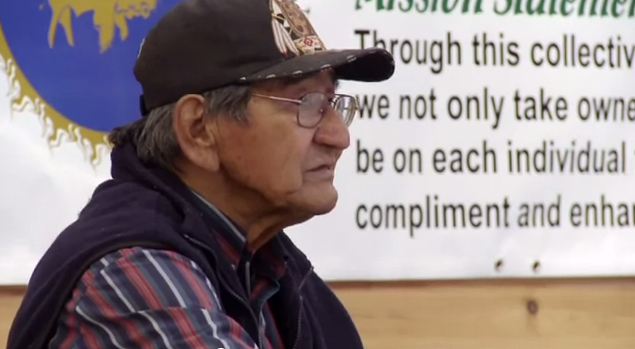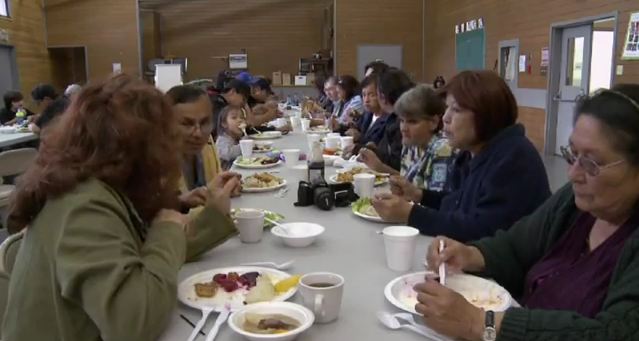Full Employment for the First Nations
“These projects have the potential of creating full employment for First Nations.” says Joe, ” It costs 7 billion dollars a year or more now for First Nations in Canada being idle, in health costs and school costs, in jail costs, justice costs, the welfare and everything else, you know a 100 acre field at £40,000 an acre returns about four million dollars, that’s not outside the realms of possibility for each reserve growing potatoes and other vegetables as well. Growing the food, getting everybody off the welfare, and feeding the rest of Canada.”
At one time in our community here at Muscoday, almost every family had a garden. There were gardens all around, we all farmed organically, and the gardens grew great, all the tomatoes tasted great, everything tasted great and everything grew well.
Daniel Musqua, 3rd Generation Organic Farmer and Muskoday First Nation Elder recalls his grandfather: “Well grandpa, he didn’t grow potatoes in a row, he grow them in mounds and between the mounds he would then put another batch of onions this way, or he would put carrots this way, it was a wonderful mixed up garden, but it was a good garden.”
“And there were also mixed farms, goats, sheep, chickens, cattle, grain farming, this community was full of small farms.”
“He would study his garden, his produce, and there were sunbirds that would come and go at the growth so he would try to find a sparrow hawk and somehow bring it over his place – I don’t know how he did that, but he was able to do that, and there were certain kinds of ants that he really looked at with great respect. They would kill some of the major insects that would eat the leaves and would eat the produce and he’d take these ants and transplant them there in the garden.
That old man had that idea way back in 1940 when he knew that if we would learn how to associate the way the plants and insects and everthing associate and live together we will be far better off for it. He was a funny old man but with traditional science, he was scientific.”
“Our farms just disappeared, our small farms gave way to bigger corporate farming and then chemical farming.”

Above: William Ermine, Saskatchewan Elder
First Nations Can’t Borrow from the Banks
“The co-op learned quickly that they would not be able to borrow, being on the reserve, as the Bank Act specifically says a First Nations person can’t borrow unless its guaranteed by the union affairs, when they’re on the reserve” explains Joe, “so they had to find a way of financing all operations from outside sources or from projected sales.
Agriculture is subsidised on this continent and where it’s not subsidised it just doesnt happen, so I fear for this project once the funding runs out of the subsidy, if the government of Canada doesnt start putting them on the same footing, the same subsidy as they’re giving other farmers.”
“We have the capability, we have all the resouces, we have all this beautiful land we have some of the most fertile land in North America, right here. We have the knowledge, the skills, the farming, our elders are still here today to teach us, so there is no reason why we can’t totally go back to re-establishing and agricultural way of life.”
“Part of our mandate of Muscoday Growers Co-operative is to share our garden bounty with our community so we are giving potatoes out to our elders, and also giving potatoes out and vegetables to the school lunch program, we are sharing our experience and our knowlendge in gardening with other First Nations, like Flying Dust and Peter Ballantine’s Cree Nations – in a sense passing on our gift that was given to us by our ancestors.
We are reaching out to other communities to form partnerships because we need partners to work with and to help grow our food, market our food, transport our food and so on.”
“Another way to double your yield is to put more plant nutrients and there are certain things you can put on that are certified for organic. They sell fertiliser made out of falcon pellets for instance. The collaboration with Peter Ballantine means we are going to have access to dried fish bones and parts and they are going to dry them and grind them up for fertiliser.”
Organic: One of the World’s Fastest Growing Industries
“We are just entering the Organic Food Industry and it is one of the fastest growing industries in the world. I’m getting a lot of enquiries from First Nations across Western Canada about what’s happening here, how can we do the same, how can we work on our own food sovereignty, food security in our First Nation.”
“Our workers are being trained how to drive tractors, how to change oil, how to weed the garden, how to identify and recognise every type of weed and pest.”
“It’s always good to learn, and I’m sure in the future I’ll be teaching my children and hopefully they’ll be feeding their families”
“I really look forward to being able to bring this stock to our community and share all of this knowledge with our people and feed our people and sustain ourselves.” – Susan Merasty, Flying Dust First Nation.
Being independant and people in the community learning new things and knowing that you can get out there and do it yourself, you don’t have to depend on anybody to do it for you” – Judy Baron, Flying Dust First Nation.
“We have to understand our duty and then apply in our community from one community to the other and then that will create unity and a voice of one people.”
“This is a journey of discovery back into our past, and we’re bringing those traditions and practices up to the present to replenish ourselves and re-energise ourselves and revitalise our community so we can be healthy again.”
And so, by following the Great Laws of Nature, all beings can live in harmony with each other and be one with Nature.



